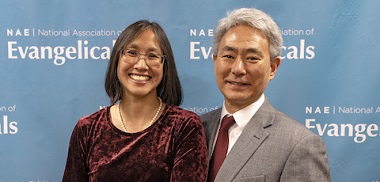
Toni and Walter Kim found their time at Regent College transformative.
Walter Kim and his wife Toni attended Regent College between 1993 and 1998. Walter went on to do a PhD at Harvard in Near Eastern civilizations and languages, and then returned to church ministry.
Last fall the National Association of Evangelicals (NAE) – which represents evangelicals in the United States – appointed him as their next president, a position he has filled since January 1.
This interview was conducted in two parts and this portion is re-posted by permission.
What makes you both hopeful for evangelical faith in America today?
Walter: One of the first things I did before I officially began my tenure as president of the NAE was to attend the World Evangelical Alliance conference in Jakarta, Indonesia. There were 1,000 delegates from nearly 90 countries.
As I looked around, and we sang worship songs in different languages, I sensed that if evangelical faith can be thriving all throughout the world, and if I get to participate in that, then I have every reason to be confident that the good news remains the good news. Even in North America.
Toni: A lot of times we think on the global scale, but I’m more detail oriented. So for me, my hope for evangelicalism in America is just the individual changed lives. Talking to people we’ve pastored, and hearing how the gospel of Jesus is changing and shaping their lives, I realized that my hope in Jesus is for the world – but it also works in individual lives.
From this, people become communities, and communities become societies. So I see the way God works both globally, but also very personally.
Yes, sometimes we forget about the microcosms of real, changed lives and instead focus on the macrocosm of media or the dominant social narrative – so it’s good to be reminded of real lives being transformed. With all that you’ve said, how do you see American evangelicalism broadening and diversifying? And is that even important?
Walter: It’s absolutely important. If the mission field of America is changing, then those who are sent on that mission, those who are good news people, we need to enter into that new reality.
So the NAE is very committed to diversifying ethnically, to strengthening the role of men and women in leadership and ministry opportunities, to build bridges with various communities of colour that perhaps historically have been underrepresented in the evangelical movement.
You know, there are many communities that may not call themselves evangelical because of America’s very complicated racial history. But many of these people are in fact evangelical by belief and practice.
For example, there was a recent survey done that 44 percent of all African-Americans – not just African-American churches, but 44 percent of African-American citizens in total – hold to evangelical beliefs. That’s an extraordinary number of people!
And if you look at the Hispanic Pentecostal churches in America, they are absolutely exploding. They are not following the narrative of white Protestant demise.
Or if you look at immigrant churches in pockets of mega-cities, they also are thriving: Southeast Asian churches, Portuguese churches in Boston. They are experiencing what missiologists call a quiet revival.
American evangelicalism is changing. The leadership needs to catch up. Formal networks or institutions like the NAE need to find creative ways of embracing that reality and building towards a future that captures that reality, because that is the Spirit of God at work.
That is so exciting to hear about, and so neat to think about how what you saw in Jakarta on a global level is also really taking shape at home, too, in North America. That’s an encouraging picture. And yet, throughout North America, the evangelical church feels a bit divided these days: across political lines, across broader ideologies, maybe even across denominations. Do you see the NAE playing a key role in healing this divide in Christ’s body?
Walter: In John 17, on one of the last nights before his crucifixion, Jesus distilled everything he stood for in that final prayer of blessing in John 17. And he prayed for unity. He prayed for our unity, which reflects the unity of the triune God – our unity as a people rooted in Christ and brought in by the Spirit in union with God. He prayed for that unity among believers as a vital aspect of our witness. This is what he chose to pray for.
Because of this, unity needs to be given the kind of priority that Jesus gave it.
That’s actually why the NAE was founded over 75 years ago, in a period of deep concern over the fragmentation of the church. Christian leaders throughout America wanted to come together and commit themselves to the core of evangelical faith and to work in collaboration and accomplish something together, much greater than what they could accomplish apart.
And so the NAE has scores of different denominations, well over 100 different organizations and institutions that work collaboratively – all sorts of churches and organizations actually connecting together. I only wish for this to continue even more as we build more bridges. Because an association that works collaboratively is no longer just a luxury. It’s a necessity going forward. It’s an important statement about the vitality of the gospel.
The full interview can be found on the Regent College site: part one and part two. Both Walter and Toni Kim were very positive about their time at Regent.
I (Flyn Ritchie) wrote several articles about the World Evangelical Alliance General Assembly in Jakarta, which I also attended; you can find them here.
Regent College’s Summer Program begins May 11 and runs until August 7; all courses will gather virtually. Evening Public Lectures, also online, run throughout the same time period.
